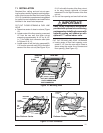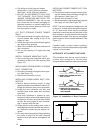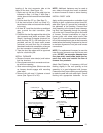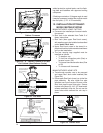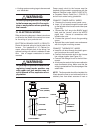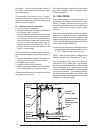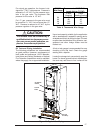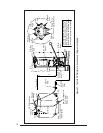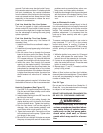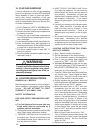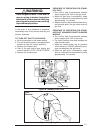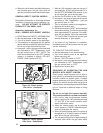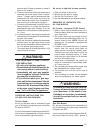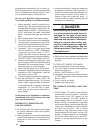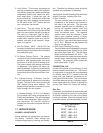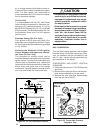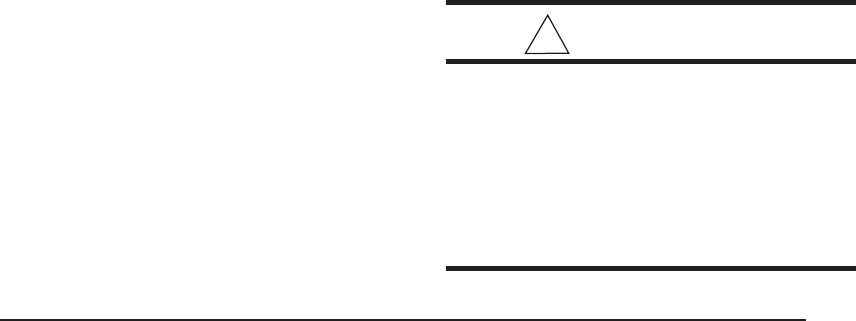
19
ground. Fuel tanks may also be buried if prop-
erly coated to resist corrosion. For below ground
fuel tank installations, the vertical dimension
from the bottom of the fuel tank to the fuel pump
must not exceed ten feet. Keep the tank filled,
especially in the summer to reduce the accu-
mulation of condensation.
Fuel Line Hook-Up: One Line System
The one line system is highly recommended
where vertical lift, from bottom of tank to pump,
is not more than eight feet. A single line hookup
has the advantage of costing less and giving
quieter operation.
Fuel Line Hook-Up: Two Line System
Use a two line system only if the vertical lift
exceeds 8 feet.
1. Install the oil feed line as outlined in steps 1-
6 below.
2. Install the oil pump bypass plug in the bottom
return port.
3. Run the return line up through the furnace
base to the return port of the pump. Run the
other end of the line to the tank, using 3/8”
O.D. copper tubing or 1/4” pipe with the ends
capped, and routing the line so it stays clean.
4. Insert the return line through the second
opening in the duplex bushing. If the bottom
of the tank is lower than the pump intake, the
tube should be inserted three or four inches
from the tank bottom. If the bottom of the tank
is higher than the pump intake, the return line
should extend not more than 8” inside the
tank.
If a two pipe system is used or if oil is taken from
the bottom of the tank, a filter is recommended.
Hook-Up Procedure (See Figure 27)
1. Use a 3/8” O.D. copper tubing for the fuel line.
Cap the end with tape to keep out dirt while
the line is being routed.
2. Install duplex bushing for two 3/8” lines in the
top fitting of the tank.
3. Insert one end of the tubing through the
duplex bushing until it is three to five inches
from the bottom drain. Tighten the bushing.
4. Run the line where it will not be subject to
damage. Also, make bends gradually and
avoid kinks which might restrict oil flow.
5. Open the furnace door. Connect the oil line
to the intake port on the pump. Tighten other
port plugs on the pump.
6. Be sure oil line is airtight! Air leaks can cause
the pump to lose prime and will create other
problems such as nozzle failure, odors, rum-
bling noise, and false safety shutdown.
7. Insert the short length of the copper tube level
with the bottom of the duplex bushing. Form
the tube into an inverted “U” to serve as a
vent.
How to Eliminate Air Leaks
To eliminate problems caused by air in the oil
line, all connections in the oil supply line and all
plugs, nuts, and fittings on the pump must be
airtight. This includes the nut that covers the
pressure adjustment. It is important that the
hook-up be done carefully and with a good
flaring tool.
To assure continuous operation, use a wire to
jump terminals T-T (or F-F) on the primary
control while burner is running. If furnace is
equipped with the Honeywell R7184 primary
control, priming oil pump procedure is as fol-
lows:
1. While the ignition is on, press, for 1/2 second
or less, and release the reset button. The
lockout time will be extended to 4 minutes.
2. If prime is not established within the 4 min-
utes, the control will lock out. Press the reset
button to reset the control.
3. Repeat steps “1” and “2”, if needed, until the
pump is fully primed.
When oil flow is clear and free of air bubbles,
close air-bleed valve and tighten. (Time to bleed
air out will vary depending on length of oil line,
number of bends, etc.)
Fuel Oil Type
Do not use fuel oil heavier than Grade No. 2.
Grade No. 1 may be used where the oil supply
is subject to low temperatures.
DO NOT USE GASOLINE, CRANKCASE OIL,
OR ANY OIL CONTAINING GASOLINE.
!
WARNING:
Failure to keep supply of oil clean by
various procedures described above
may cause failure of certain compo-
nents such as the fuel pump gears,
check valve, shaft seal, or burner
nozzle which may result in a burner
fire.



